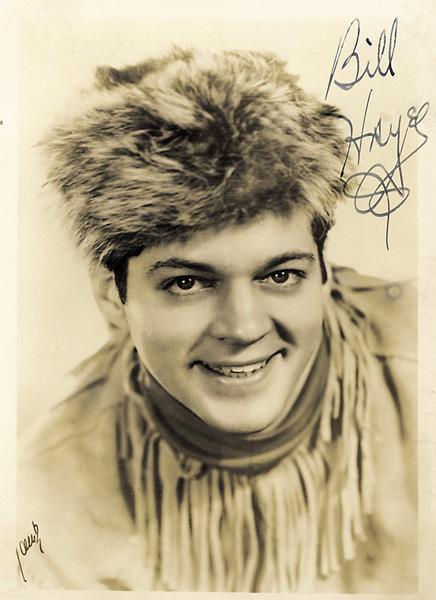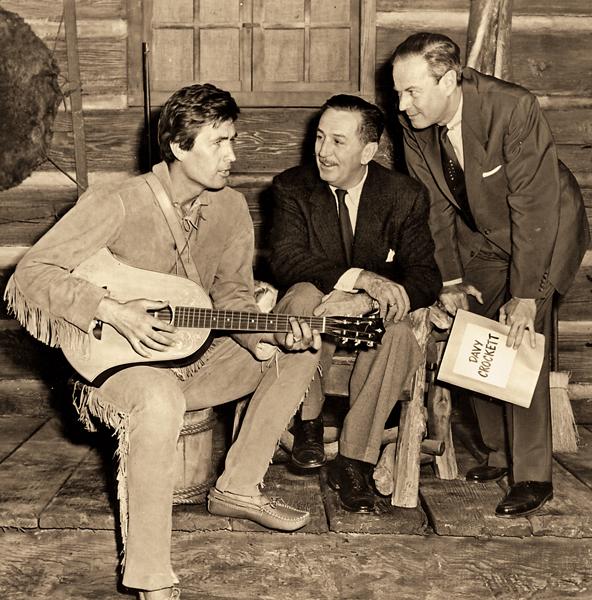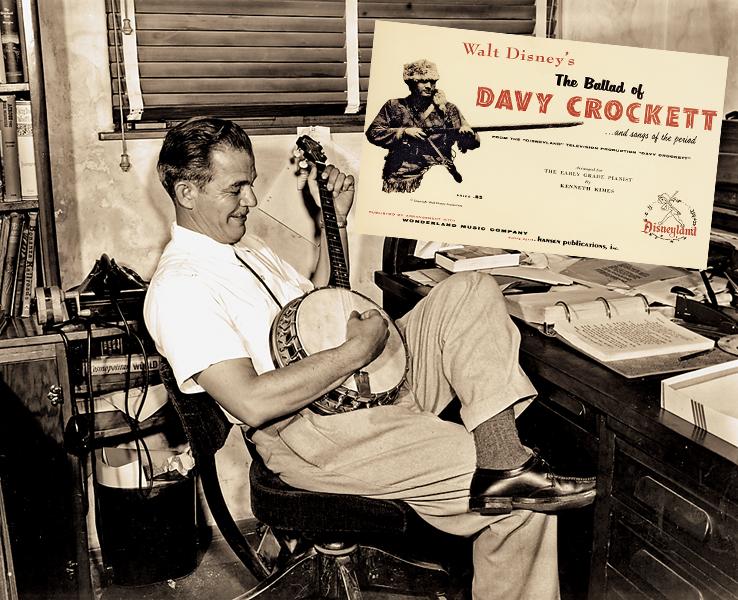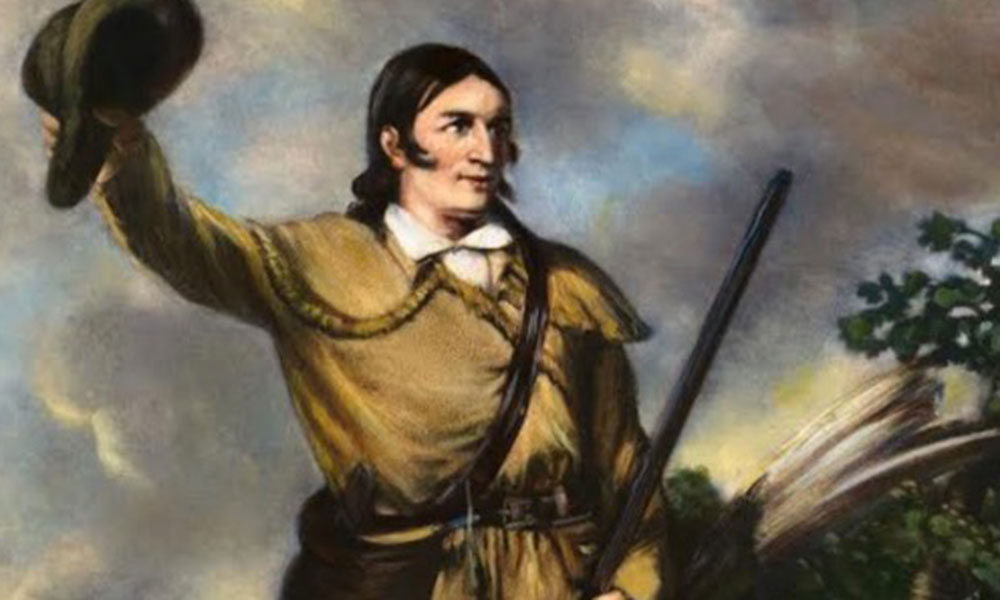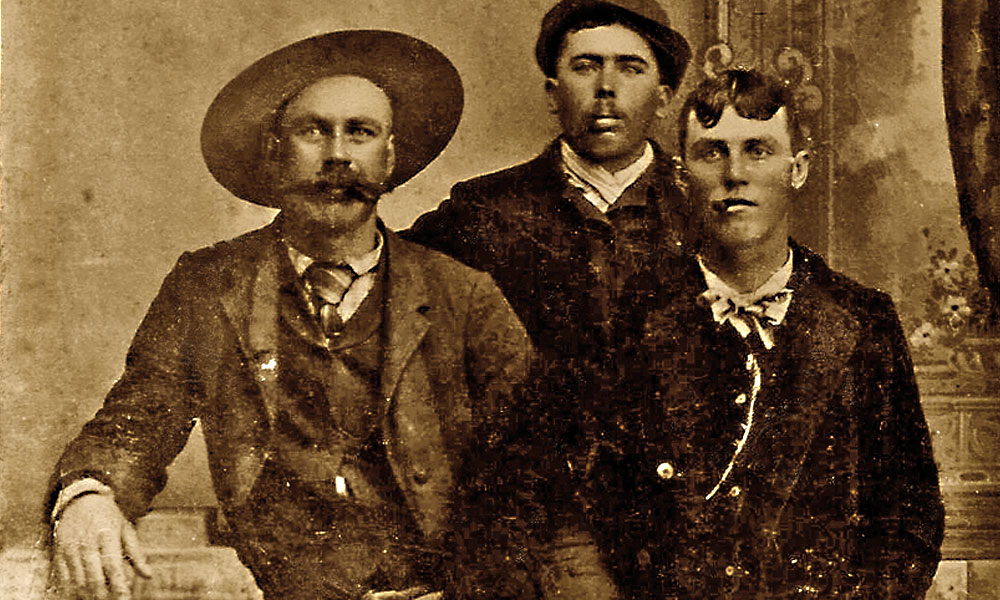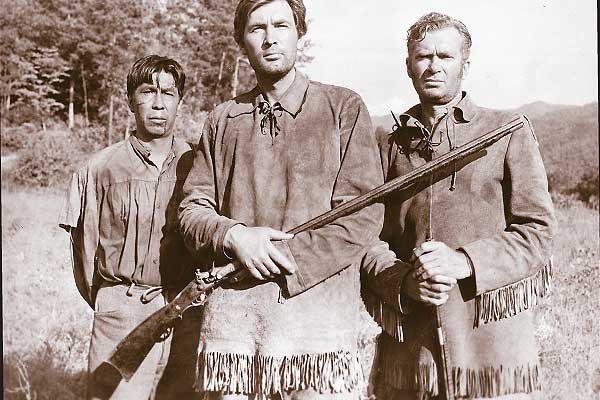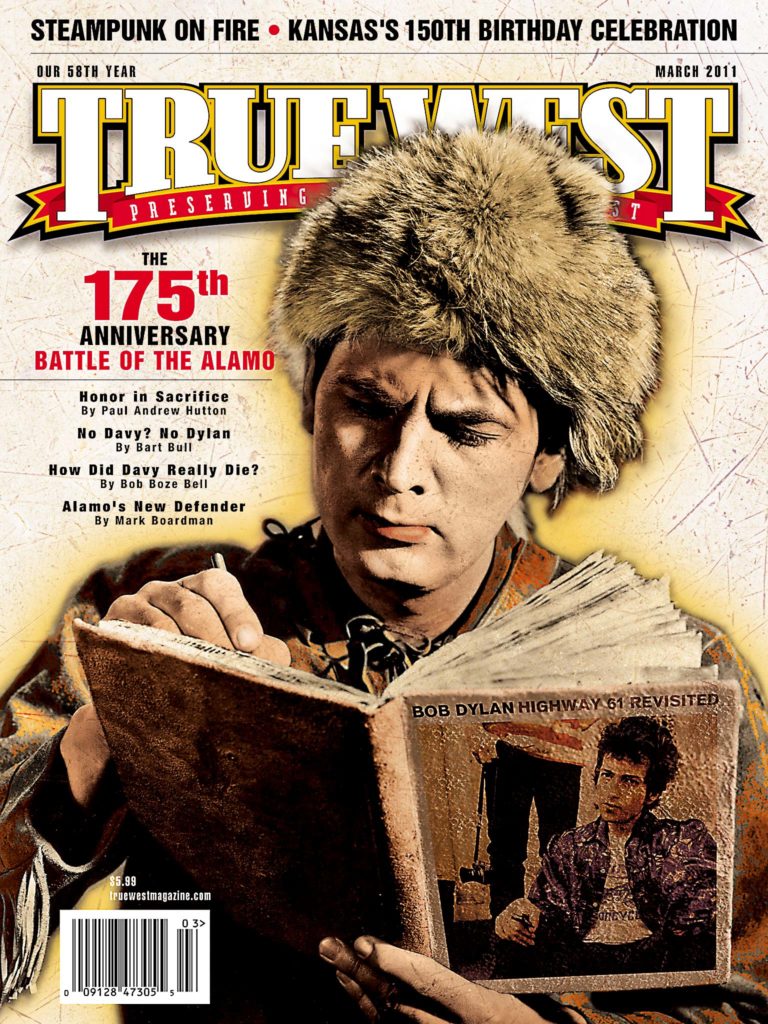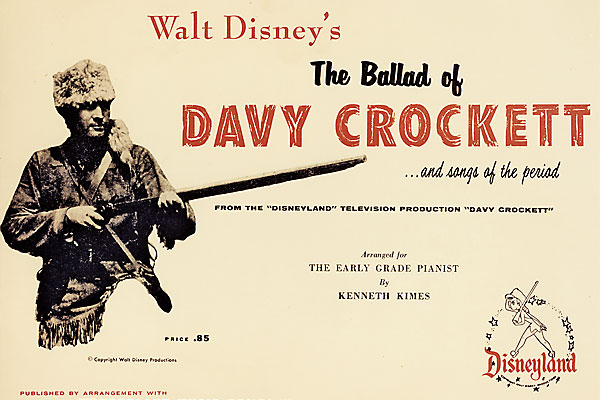
The Great Coonskin Cap craze of 1955 resulted in the Great Raccoon Shortage of 1955.
In the absence of fresh pelts, desperate furriers remodeled molting raccoon coats, long abandoned in the wake of the Great Raccoon Coat craze of the mid-1920s, from way back when no freshman frat boy felt fully warm and wonderful without one. Can it be that some sort of . . . well, you wouldn’t want to say “wisdom,” exactly . . . but at least some curious cultural crossover took place when the ancient armpit stains of a ukulele-strumming college boy pressed against the near-empty forehead of a prepubescent 1950s kid, each perfectly united in fad-driven fatuousness? Or were they both just fat-heads? Either way, “Davy Crockett: Indian Fighter” debuted on ABC’s Disneyland on December 15, 1954. Thus began the Sixties.
If 1955 was the year Rock’n’Roll was born—and it wasn’t—it was definitely the year “Rock Around the Clock” got knocked off the charts. As irony piled up like jukebox hotcakes, Bill Haley & His Comets’ revolutionary breakthrough hit wasn’t defeated by the dread sugar-saturated pop confections of the day, by “Mr. Sandman” and “Cherry Pink and Apple Blossom White,” nor even by Pat Boone’s notorious hollow-soul Little Richard covers.
Instead, Rock’n’Roll got shown to its seat by a song from an old-fashioned blackface minstrel show, by a super-cheerful version of “The Yellow Rose of Texas,” by a jaunty lament for a light-skinned mulatto gal, as orchestrated by the beaming Mitch Miller. The goatee-sporting A&R director of Columbia Records, America’s biggest, grandest, most distinguished label, Miller was notable for his complete, unequivocal disdain for the philistine sounds of Rock’n’Roll. He personally made certain that Columbia would remain untainted and unstained by primitives such as Elvis and his ilk, and thus, when it was eventually acquired by Sony in the age of catalog CD reissues, Columbia had an almost two-decade-long soft spot.
Instead, at that moment, Pop music’s new lightweight champion was Folk, Americana-style, as purely and authentically fake as Americana has always and ever been. This was Folk music from Frontierland, born on a mountaintop (even while the Matterhorn was not yet under construction) under the guidance of Walt Disney and the publishing hacks of Tin Pan Alley, as designed for the unveiling of a shiny new nation named “Disneyland”—theme park, television show and avid, active, adventurous, dial-adjusting assembler of history.
The spin-off products would arrive shortly . . . as indeed would “Spin and Marty.” Just as Americana itself was a spin-off of Abby Aldrich Rockefeller’s own annoyance at not being able to properly steer her Museum of Modern Art singlehandedly, and thus having to invent her very Disneyesque concept of American Folk Art, while sending out “curators” to buy it wholesale, lock, stock, Pennsylvania Dutch hex sign and barrel.
Three faux-Folk songs stayed stuck separately at Number One for week after week through much of 1955. It was (or at least was supposed to be) an extremely unified country back then, and Pop culture not only confirmed but proved it, cementing it solidly in place with stirring Americana-ism. Those three songs were “The Ballad of Davy Crockett,” “The Yellow Rose of Texas” and “Sixteen Tons.” Without them, without their massive, mighty success and the silent Shenandoah of shekels that flowed beneath them, there would likely have been no Folk music revival of the 1960s, no Kingston Trio, no Peter, Paul & Mary and definitely not Peter Paul & Mary’s manager’s publishing side-project, Bob Dylan. Or, for that matter, much of the rest of what followed. No Davy? Hey, definitely no Dylan.
Davy came first — Davy Crockett, King of the Wild Frontier. And what a wild frontier! So wild that even Walt Disney hadn’t managed to pre-copyright the phenomenon. Who knew that you could sell Old America to young Americans so successfully? Who’da thunk it? (Other than, of course, kindly Uncle Walt.) Even Disney, busy launching a TV show to pre-launch his theme park, forgot to frontload the merchandising. Raccoons, briefly pausing to wash their paws, began edging anxiously toward Canada.
Rock ’n’ Roll was most surprising—to anybody who’d been paying attention, anyway—because all its publishing money hadn’t been sewed up. It was almost entirely the product of independent record labels who’d been forced to bottom feed the murky ponds of Rhythm & Blues and Hillbilly simply because they couldn’t pay to play in the big kids’ pool. Then, and now, publishing was the secret source of much of the secure money in show business; then, and now, it was the undiscussed source of funds for payola, the steady stream of secret dollar signs that musicians mostly learn about only after it’s a whole lot too late.
There were literally dozens of versions of “The Ballad of Davy Crockett”—Fess Parker’s version was actually the also-ran; soap opera star Bill Hayes had the biggest hit—and every time it was sung, by Hayes or Parker or Tennessee Ernie Ford, by the Sons of the Pioneers, by Louis Armstrong (admittedly not one of his finest trumpet solos, even while his lengthy lyric variations are immortal; The Supremes’ high-on-a-hilltop proto-Hiphop version arrived significantly later, and, astonishingly, stayed officially unreleased; “He sure loved those woods!… mmmmmhh!! Da-a-vy!”) or by Burl Ives or Eddy Arnold or Lawrence Welk’s basso-profondo Larry Hooper, the silent coins of publishing clinked into Disney’s tri-piggy-bank-fecta. The “Ballad” wasn’t in the Public Domain, but it sure sounded like it ought to have been. That may have been the biggest secret of all.
Meanwhile, Mitch Miller was launching a new career as one of the most famous Americans of the day, with his absurdly-influential hit television show of sing-along songs based, whether anyone acknowledged it or not, on those happy-go-lefty Folkniks, the Weavers. Who had, in 1950 or so, ditched both drunk-ass Woody Guthrie and their own Stalinist politics to sing barbershop harmonies to “On Top of Old Smokey” and “Goodnight, Irene” and “Kisses Sweeter than Wine” (publishing rights for the latter two stripped from their close friend Lead Belly, who died in glorious poverty, but not from the eternally vigilant Folk-collecting Lomaxes) into massive chart-busting long-term Number One hits. (Their apple-blossom white collective collected the publishing collectively under the pseudonym “Paul Campbell.” Just as banjo-plinking Weaver Pete Seeger would eventually individually claim and collect authorship on hundreds of songs like “Wimoweh (The Lion Sleeps Tonight)” and “Guantanamera.”)
Mitch Miller’s initial aping of the Weaver’s ultra-white orchestrated Americana-ism was nothing less than “The Yellow Rose of Texas.” It was the tale of a “yella gal,” a quadroon, a mulatto woman left behind, and it was part of the blackface minstrel tradition that had pretty much been American showbiz for more of our un-Americana-like history than we’d wish to remember. But it arrived in a moment of crotchety Crockettism, of inaccurately remembering the Alamo as a-historically as possible, as a symbol of defeating not merely the Mexicans but the soon-to-be-Sputnik-launching Soviets as well.
Now, “Sixteen Tons”—that’s the third tale. Merle Travis, the song’s author, was every bit the authentic working-class coal-miner’s kid that all the larger-than-life Folk music heroes, including both Woody Guthrie and Pete Seeger, desperately wished to be, but entirely altogether unlike either of the two of ’em, he could write snappy lyrics and pick the bejeezus out of a set of strings. Still, he was just like them both in one way—when the first opportunity came, he got the hell gone out of Dodge and headed off for Hollywood or thereabouts.
Cliffie Stone, pudgy bass-fiddle-bumpin’ son of the original Beverly Hillbillies’ Herman the Hermit (and yes, the radio Hillbillies did indeed succeed in its multi-million dollar lawsuit against the television Hillbillies who’d snatched the name) came to Merle one day, in the heart of the 1940s, with Burl Ives having a shocking huge Columbia Records success with “authentic Folk songs.” Cliffie, nothing like a fool, would personally crank-start the careers of Ferlin Husky, Buck Owens, Merle Haggard (named for Merle Travis) and many, many more, had a hot idea. “How’d you like to make a Folk music album?” he asked.
Rent was due. “How much does it pay?” asked Merle.
Well, not so very dang much . . . not until the publishing royalties show up.
Merle spent most of that night parked on his Indian motorcycle ’neath the foggy streetlights of Hermosa Beach, writing or faking or cobbling together songs like “Dark as a Dungeon (Way Down In the Mines)” and “I Am a Pilgrim” and “Nine Pound Hammer” and such. It’s possible, there alongside the Lighthouse jazz club, that he may have drank down a soda pop or two. He also knocked off a song called “Sixteen Tons.” Next day, in the same studio where Nat King Cole recorded, he played ’em with an acoustic guitar. The album, Folk Songs of the Hills, flopped.
As did that particular “Folk revival.” It was just about a decade later that Merle’s close compadre, a disc jockey named Tennessee Ernie Ford, needed a fast follow-up to his third-place cover version of “The Ballad of Davy Crockett.” “Sixteen Tons” became a sensation, massive, a bigger hit and even quicker so than “Davy Crockett” or the “Yellow Rose”—as big, even, as “Goodnight, Irene” had been five years before. Curiously, every American seemed to know the coal-miner blues of owing their soul to the company store. It was, in its soulful way, protest music even before such a phrase existed.
The result of all this Americana-ism was a tremendous outflow and an opening up, and a free-wheeling publishing jubilee. Over the next few years, a curious kind of faux-authentic Americana would issue forth from radios and jukeboxes, at just the time that cultural historians from the Baby Boom era tend to retrospectively declare the triumphal moment of Rock’n’Roll. It crossed boundaries and barriers, and it worked hard, just like the TV Westerns in that same moment, at retelling the Tall Tale of America. Johnny Horton’s version of Jimmy Driftwood’s “Battle of New Orleans” (set to the traditional fiddle tune of “The Eighth of January”) may have seemed emblematic, but then soon enough so did “North to Alaska” and “Sink the Bismarck.” (Not to mention “Honky Tonk Man.”) Johnny Cash had a near miss with the Johnny Yuma TV theme for The Rebel, but a hit with “Don’t Take Your Guns to Town.” Marty Robbins crossed every chart with his Mexicana-esque corrido “El Paso,” and then “Big Iron” and other gunfighter ballads. Lefty Frizzell’s career revived with the pseudo-Appalachian murder ballad “Long Black Veil,” and then again with “Saginaw, Michigan,” but it was a real murder ballad named “Tom Dooley” that truly turned loose the demons of music publishing.
Tom Dooley (or Tom Dula, anyway) had truly existed and been hanged genuinely good and high. His ballad, however, had been field-recorded and folk-collected to within an inch of its life, and as a result, as a crew cut set of college boys wearing jaunty banjo-spankin’ minstrel-show stripes racked up the biggest hit since “Sixteen Tons,” some of the most prominent figures in the publishing business smelled blood in the water. (Tex Ritter’s take on the traditional cowboy ballad “Blood on the Saddle” showed up later, in 1959.)
Ralph Peer had discovered both Jimmie Rodgers and the Carter Family in one blow, and had basically invented the modern business of music publishing, while also being a primary pioneer in the early recording of Blues, Country and Spanish music. He had never claimed to do it for any altruistic reasons whatsoever.
Alan Lomax had, with his father John, used the authority of the Library of Congress to “field record” Negro prisoners and impoverished mountaineers and, always in the name of the greater good, ended up with the name “Lomax” on the publishing royalties.
Howie Richmond had been a New York City publisher who’d been perfectly happy to help Pete Seeger and Woody Guthrie and anybody else take any “Folk song” that would quit wiggling and put their own names on it so they could all get paid.
Frank Warner had been a “Folk song collector” who’d “collected” “Tom Dooley” from a mountaineer named—sad irony!—Frank Proffitt, and then seen it show up in one of the Lomax’s beloved books of American heritage.
Once “Tom Dooley” became the biggest thing since the rise of the transistor radio, well, the outcome was clear—all hell broke loose. According to each of ’em, despite the fact that “Folk songs” were said to have never been written by nobody, they each owned all of it.
Back in December 1955, when Mrs. Rosa Parks was escorted off a Montgomery, Alabama, bus, its driver, James Blake, wasn’t playing a transistor radio. The very earliest primitive models were only just arriving that Christmas, though their effect would be transformative. But if there was a tube radio playing in the background at the police station where she was held, prominent among the Christmas carols were “The Yellow Rose of Texas,” “Sixteen Tons” and, yes, “The Ballad of Davy Crockett.”
The light-skinned black woman—a “yella gal”—a freelance seamstress, tired from another long day at low pay, was, at age 42, just another day older and deeper in debt. She was about to turn Montgomery and the rest of America—the real America, not its “Americana” version—into a new wild frontier, five years before John F. Kennedy declared his “New Frontier.”
Only five months before, Mrs. Parks had attended astonishingly racially-integrated classes at the radical Highlander Folk School, located at the very tip top of the Cumberland Plateau in Tennessee, greenest state in the land of the free. Tennessee would very shortly close that “folk school” down; too late. Mrs. Parks, like Mr. Crockett, had seen her duty, handled her risky chore and made herself a legend forevermore. You might say that the Civil Rights Movement was born on a mountaintop in Tennessee.
Founding editor of SPIN, Details and Sounds, former West Coast editor of Vogue and multiple winner of the Deems Taylor Award for excellence in music writing, the reporter/ critic/columnist/author Bart Bull is undoubtedly the finest pedal-steel player in Paris’s 18th Arrondissement.
Photo Gallery
– All images courtesy Disney –


